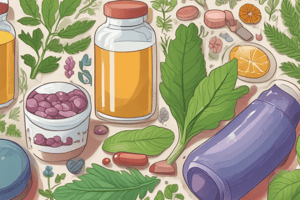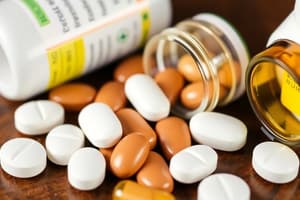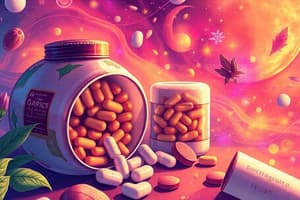Podcast
Questions and Answers
Which herb is associated with an increase in energy levels?
Which herb is associated with an increase in energy levels?
- Feverfew
- Ginkgo-biloba
- Ginseng (correct)
- Black licorice
What is a common effect of black licorice when consumed in large amounts over an extended period?
What is a common effect of black licorice when consumed in large amounts over an extended period?
- Increased blood pressure (correct)
- Increased potassium levels
- Decreased blood pressure
- Decreased cholesterol
Which herb interaction is most likely to lead to increased risk of serotonin syndrome?
Which herb interaction is most likely to lead to increased risk of serotonin syndrome?
- Ginkgo-biloba (correct)
- Kava Kava
- Valerian
- St. John's wort
Which herb is known to decrease insulin levels in diabetics?
Which herb is known to decrease insulin levels in diabetics?
Which herb is known for regulating hormones and decreasing stress levels?
Which herb is known for regulating hormones and decreasing stress levels?
Which of the following is increased by the use of turmeric?
Which of the following is increased by the use of turmeric?
Which herb interaction may result in decreased effects of CCB (calcium channel blockers)?
Which herb interaction may result in decreased effects of CCB (calcium channel blockers)?
Which herb is effective in assisting with urinary retention and nocturia?
Which herb is effective in assisting with urinary retention and nocturia?
Which of the following is true about Kava Kava's interactions?
Which of the following is true about Kava Kava's interactions?
Which herb is known to decrease nausea and is also effective for IBS?
Which herb is known to decrease nausea and is also effective for IBS?
Flashcards
Ginseng
Ginseng
A common herb known for its potential benefits in reducing blood sugar levels, stress, blood pressure, and sexual dysfunction while also increasing energy levels.
Herb-Drug Interactions: Ginseng and Insulin/Oral Hypoglycemics
Herb-Drug Interactions: Ginseng and Insulin/Oral Hypoglycemics
This herb can interact with insulin and oral hypoglycemic agents, leading to increased effects of CNS depressants and anticoagulants, while potentially decreasing the effectiveness of morphine.
Ginkgo-biloba
Ginkgo-biloba
Ginkgo biloba is an herb rich in antioxidants known to improve blood flow and memory while reducing blood pressure. It can increase the risk of serotonin syndrome when combined with tricyclic antidepressants and may also interact with anticoagulants and insulin levels.
Black Licorice
Black Licorice
Signup and view all the flashcards
Ginger
Ginger
Signup and view all the flashcards
Feverfew
Feverfew
Signup and view all the flashcards
Garlic
Garlic
Signup and view all the flashcards
Valerian
Valerian
Signup and view all the flashcards
Kava Kava
Kava Kava
Signup and view all the flashcards
St. John's Wort
St. John's Wort
Signup and view all the flashcards
Study Notes
Ginseng Interactions
- Decreased Effects: Blood sugar (BS), stress, blood pressure (BP), and sexual function.
- Increased Effects: Energy levels.
- Interactions with other medications: Note potential interactions with insulin and oral hypoglycemic agents.
Ginkgo Biloba Interactions
- Ginkgo Biloba's Actions: Antioxidant, increases blood flow and memory.
- Decreased Effect: Blood pressure (BP)
- Interactions with Medications: May increase risk of serotonin syndrome with tricyclic antidepressants. Potentiates anticoagulants. May decrease insulin levels in diabetics.
Black Licorice Interactions
- Hormone Regulation: Decreases stress and fat.
- High Dose Concerns: (4+ weeks): Headaches (HA), increased blood pressure (BP), decreased potassium (K). Dangerous at high doses.
- Interactions with Medications: Increases effects of digoxin(dig), aspirin (GI irritation), steroids, potassium loss with laxatives.
Ginger Interactions
- Decreased Effects: Nausea, Irritable Bowel Syndrome (IBS), stomach issues, inflammation.
- Increased Effects: Anticoagulants.
Feverfew Interactions
- Decreased Effects: Fever, inflammation, migraines/dizziness, nausea/vomiting (N/V), tinnitus, blood pressure (BP)
- Increased Effects: Anticoagulants and Nonsteroidal Anti-inflammatory Drugs (NSAIDs).
Garlic Interactions
- Blood Thinning Effect: Thins blood.
- Increased Effects: Immunity, anticoagulants.
- Decreased Effects: Cholesterol.
Valerian Interactions
- Valerian's Action: Relieves sleep disorders.
- Decreased Effects: Anxiety, blood pressure (BP).
- Increased Effects: Central nervous system (CNS) depressants (such as benzodiazepines, barbiturates, anticonvulsants, and sedatives).
Kava Kava Interactions
- Kava Kava's Action: Relieves sleep problems; decreases stress, anxiety, convulsions; relaxes muscles.
- Increased Effects: Central nervous system (CNS) depressants, Adderall, 5-HTPs.
St. John's Wort Interactions
- Decreased Effects: Depression, anxiety, insomnia.
- Increased Effects: Appetite, central nervous system (CNS) depressants.
Melatonin Interactions
- Melatonin's Action: Reduces insomnia, and antidepressant effects of desipramine and fluoxetine (Prozac).
- Calcium Channel Blocker (CCB) Interaction: CCBs may decrease melatonin levels.
Saw Palmetto Interactions
- Decreased Effects: Benign Prostatic Hyperplasia (BPH), urinary retention, nocturia, assists in initiating urination.
- Decreased Absorption: of iron, oral contraceptives.
- Important Considerations: Avoid during pregnancy, lactation, or in hormone-sensitive cancers.
- Interaction with Finasteride: Do not use with finasteride (Proscar) due to similar effects.
Turmeric Interactions
- Decreased Effects: Inflammation, tumors, infections, stomach problems.
- Increased Effects: Anticoagulants.
- Interactions with Stomach Acid Regulators: Decreases the effects of PPIs (Proton Pump Inhibitors) and H2 blockers, possibly increasing stomach acid levels.
Studying That Suits You
Use AI to generate personalized quizzes and flashcards to suit your learning preferences.
Description
Test your knowledge on the interactions of various herbal supplements including Ginseng, Ginkgo Biloba, Black Licorice, and Ginger. Understand how these herbs can affect medications and overall health. Explore the potential risks and benefits associated with these supplements.




